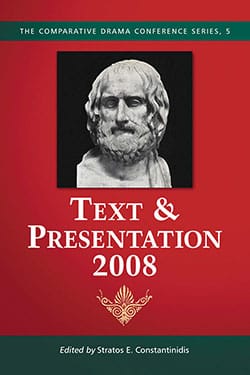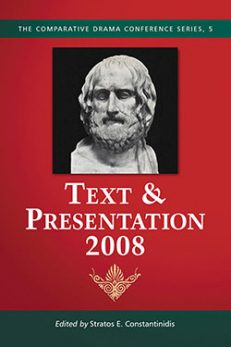Text & Presentation, 2008
Original price was: $65.00.$32.99Current price is: $32.99.
In stock
About the Book
Text & Presentation is an annual publication devoted to all aspects of theatre scholarship. It represents a selection of the best research presented at the international, interdisciplinary Comparative Drama Conference.
This anthology includes papers from the 32nd annual conference held in Los Angeles, California. Topics covered include masculinity in the plays of Tennessee Williams and Frederico Garcia Lorca; Moliere’s revolutionary dramaturgy; motherhood in Medea; Electronovision and Richard Burton’s Hamlet; and José Carrasquillo’s all-nude production of Macbeth, among many others.
About the Author(s)
Bibliographic Details
Edited by Stratos E. Constantinidis
Format: softcover (6 x 9)
Pages: 255
Bibliographic Info: 7 photos, notes, bibliographies, index
Copyright Date: 2009
pISBN: 978-0-7864-4366-6
eISBN: 978-0-7864-5289-7
Imprint: McFarland
Series: The Comparative Drama Conference Series
Table of Contents
Acknowledgments
Preface
1. Martyred Masculinities: Saint Sebastian and the Dramas of Tennessee Williams and Federico García Lorca 5
(José I. Badenes)
2. How to Do Things with Witches: Performing The Crucible on Stage and Screen 18
(Katherine Egerton)
3. Molière’s Revolutionary Dramaturgy 28
(Stephen H. Fleck)
4. Constructions of Motherhood in Euripides’ Medea 42
(John Given)
5. Becoming Romantic: Women’s Sexual Encounters with the Other in Mourning Becomes Electra and Machinal 55
(Les Hunter)
6. “To Be, Or to Be Recorded”: The Burton Hamlet, the Wooster Group, and the Miracle of Electronovision 67
(Lindsay Brandon Hunter)
7. “Is This a Dagger I See Before Me?”: José Carrasquillo’s All-Nude Production of Macbeth 78
(William Hutchings)
8. Cognitive Model Transformation in Brecht’s The Caucasian Chalk Circle 90
(David Paxman and Michael Hatch)
9. Parables for His People: Legal and Religious Authority in the Plays of Stephen Adly Guirgis 110
(David Pellegrini)
10. Classroom Drama: Beckett for the High School Set 123
(Doug Phillips)
11. Anne Hébert’s La cage: A Masque of Liberation 132
(Gregory J. Reid)
12. Mohammad bin Tughlaq: A Fourteenth Century Muslim Sultan in 1960s South India 145
(Kristen Rudisill)
13. The Music Man Cometh: The Tuneful Pipe Dreams of Professor Harold Hill 157
(Michael Schwartz)
14. Tragic Ways of Killing a Child: Staging Violence and Revenge in Classical Greek and Chinese Drama 166
(Fei Shi)
15. Brecht and Bullough: Measuring the Distance in Mother Courage 180
(Diane M. Somerville-Skinner)
16. The Argonautic Myth as Subtext of Shakespeare’s The Tempest 192
(Mary Frances Williams)
17. American Musical Theatre: A Review Essay 205
(Stacy Wolf )
Review of Literature: Selected Books
Graley Herren, Samuel Beckett’s Plays on Film and Television 211
(Mary Bryden)
Toril Moi, Henrik Ibsen and the Birth of Modernism: Art, Theater, Philosophy 213
(Miriam Chirico)
Enoch Brater, ed., Arthur Miller’s Global Theater 217
(Katherine Egerton)
Mary Luckhurst, Dramaturg y: A Revolution in Theatre 219
(Christopher Innes)
Kiki Gounaridou, ed., Staging Nationalism: Essays on Theatre and National Identity 221
(Siyuan Liu)
Shepherd-Barr, Kirsten. Science on Stage: From Doctor Faustus to Copenhagen 223
(Jeffrey B. Loomis)
Philip C. Kolin, Contemporary African American Women Playwrights: A Casebook; Kevin J. Wetmore Jr. and Alycia Smith-Howard, eds., Suzan-Lori Parks: A Casebook 226
(Annette Saddik)
Simon Goldhill, How to Stage Greek Tragedy Today 230
(James T. Svendsen)
Amy Scott-Douglass. Shakespeare Inside: The Bard Behind Bars 232
(Sara L. Warner)
Index 235
Book Reviews & Awards
“edited with care…preserves the conference experience by extending its scholarly dialogue to the wider reading community…many fine essays”—New England Theatre Journal.





